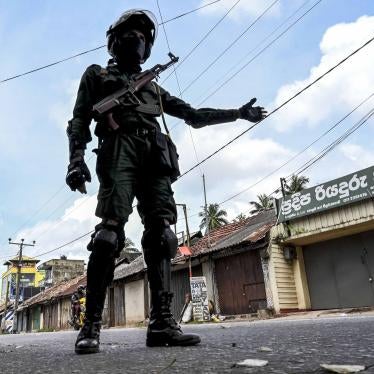(New York) - The Indian government should immediately order an investigation of Narendra Modi, the chief minister of Gujarat, for statements apparently endorsing the extrajudicial execution of a terrorism suspect by the police, Human Rights Watch said today.
Gujarat’s antiterrorism squad in November 2005 gunned down Sohrabuddin Sheikh, whom police claimed was a militant conspiring to kill Modi. The Gujarat government has since admitted that there is no evidence Sheikh was a terrorist and that he had been executed in a fake “encounter,” one in which police falsely claimed that he had been killed in an exchange of fire. In July, the government filed charges against several police officials. In a speech on December 5, however, Modi suggested that people like Sheikh deserved to be killed.
“Modi’s remarks send a green light to the police that executing terrorism suspects is fine with his administration,” said Brad Adams, Asia director at Human Rights Watch. “The government in Delhi should immediately investigate this seeming incitement to violence.”
At a rally in his campaign for re-election as chief minister, Modi said that Sheikh “got what he deserved.” Modi asked the crowd, “What should have been done to a man from whom a large number of AK-47 rifles were recovered, who was on the search list of police from four states, who attacked the police, who had relations with Pakistan and was eyeing to enter Gujarat?”
The crowd replied “mari nakho-mari nakho” (kill him, kill him), to which Modi said, “Does my government need to take permission of Soniaben [Congress Party leader Sonia Gandhi] for this? Maut na Saudagar [merchants of deaths] will be dealt in the same fashion on the land of Gujarat.”
After widespread criticism of his remarks, the Bharatiya Janata Party (BJP) politician explained that he had been provoked and was responding to the allegation by Congress Party leader Sonia Gandhi that his government was a “merchant of death.”
“Modi cannot hide behind accusations of provocation to justify remarks endorsing a murder,” said Adams. “He used similar excuses after the police participated in a killing spree of Muslims in 2002, but his pretexts were as hollow then as they are today.”
After Sheikh’s killing, his family filed a petition with the Supreme Court requesting an independent investigation. In its response to a Supreme Court notice, the state government admitted that Sheikh had been murdered in a false armed “encounter.” The Supreme Court ordered the Gujarat government to create a special police team to investigate the case and submit status reports. In July, the Gujarat police filed charges against 13 police officials, including D G Vanzara, who headed the anti-terror squad.
In its charge sheet, the police said that Sheikh and his wife Kausar Bi were pulled out of a bus by members of the Gujarat antiterrorm squad on November 22, 2005. They were secretly detained for four days. (They were not carrying any weapons as alleged by Modi in his speech). According to an eyewitness, early in the morning of November 26, Sheikh was taken to the outskirts of Ahmedabad, where he was shot by police officers. His body was then taken to the hospital and a police report filed which claimed that he had been killed in an exchange of fire.
The whereabouts of Kausar Bi remains unknown. Police investigations suggest that she was killed and her body burnt.
In response to Modi’s comments, India’s Election Commission has served notice to Modi saying that it is of the view that the speech “amounts to indulging in activity which may aggravate existing differences, creating mutual hatred and causing tension between different communities.” Modi has until December 8 to respond.
Local activists and Muslim organizations have long accused Modi of responsibility for the anti-Muslim violence in Gujarat in February and March 2002, which left at least 1,000 dead. After 59 Hindu pilgrims died during a mob attack by Muslims on their train in Gujarat in 2002, Hindu militant groups carried out widespread and coordinated attacks on Muslims in which thousands were killed, hundreds of women were raped and Muslim properties destroyed.
Human Rights Watch found that the attacks on Muslims were planned and organized with extensive police participation and in close cooperation with supporters of Modi’s ruling Bharatiya Janata Party and the state government. Modi had justified those attacks at the time, saying that, “Every action has an equal and opposite reaction,” referring to the Godhra incident.
“Modi’s defenders say that his speech is being misrepresented, and that politicians make exaggerated remarks during election campaigns,” said Adams. “But endorsing a police killing sends the wrong message at all times, and especially during an election.”






